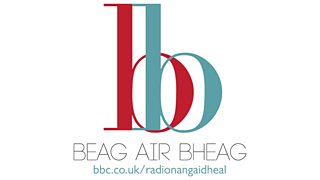Oisean a' Ghrà mair: Sreath 3: 5
1. SÙIL AIR AIS: as motha / a bu mhotha (‘biggest’, etc. )

Faic BEAG AIR BHEAG 3, Prògram 4. (Cuideachd: BEAG AIR BHEAG 1, Prògraman 3 & 4.)
Màiri Bremner:
“Bha tòrr uallach ormsa mar an duine a bu shine anns an teaghlach.”
“There was a lot of responsibility on me as the oldest one in the family.”
sean (n)as sine (n)a bu shine
an duine as sine ‘the oldest person’ (now)
an duine a bu shine ‘the oldest person’ (then)
duine nas sine ‘an older person, somebody older’ (now)
duine na bu shine ‘an older person, somebody older’ (then)
’S e Màiri a bu shine. ‘Màiri was the oldest.’
’S i a bu shine. ‘She was the oldest.’
Is mi as sine. ‘I’m the oldest.’
Tha mi nas sine na iadsan. ‘I’m older than them.’
Bha iad na bu shine na esan. ‘They were older than him.’
2. as coireach, a bu choireach
Dè as coireach? = Dè an t-adhbhar? Carson?
Dè ’s coireach ri sin? What’s the reason for that?
Dè ’s coireach ris an dàil? What’s the reason for the delay?
Dè ’s coireach ris an atharrachadh seo? ‘What’s the reason for the change?’
Dè ’s coireach gun do dh’fhalbh iad cho tràth? ‘How come they left so early?’
Dè ’s coireach gu bheil an trafaig cho slaodach? Why’s the traffic so slow?’
Dè as coireach gu robh uallach cho mòr air Màiri? ‘Why did so much responsibility fall on Màiri?’
Dè ’s coireach nach eil thu a’ coiseachd ceart? ‘How come you’re not walking properly?’
Dè ’s coireach nach eil sibh a’ bruidhinn ri chèile? ‘How come you’re not talking to each other?’
Dè ’s coireach nach cuala mi mu dheidhinn seo? ‘How come I didn’t hear of this?’
’S e sin as coireach. ‘That’s why, that’s the reason.’
’S e mise as coireach. ‘It’s because of me.’ No fiù’s ‘I’m to blame.’
’S e a’ chlann as coireach. ‘It’s because of the children.’ No ‘It’s the children’s fault.’
’S e an trafaig as coireach. ‘It’s because of the traffic.’ ‘The traffic’s to blame.’
Dòmhnall Moireasdan (ri Màiri Bremner):
“ ’S e gun deach sibh air a’ Chomhairle as coireach gu bheil sibh nur suidhe an seo, as coireach gu bheil sibh cho ainmeil ’s a tha sibh.”
“It’s that you went on the Council that explains why you’re sitting here, why you’re as famous as you are.”
(‘It’s because you went on the Council that you’re sitting here, that you’re as famous as you are.’)
N.B.
as sine a bu shine
as motha a bu mhotha
as coireach a bu choireach
’S e sin a bu choireach. ‘That was why, that was the reason.’
’S e mise a bu choireach. ‘It was because of me.’ (No fiù’s: ‘I was to blame.’)
’S e a’ chlann a bu choireach. ‘It was because of the children.’ (‘It was the children’s fault.’)
’S e an trafaig a bu choireach. ‘It was because of the traffic.’ (‘The traffic was to blame.’)
3. ÀS DÈIDH (‘after’)
Màiri Bremner:
“Bha tòrr uallach ormsa mar an duine a bu shine anns an teaghlach a bhith a’ coimhead às an deoghaidh.”
‘There was a lot of responsibility on me as the oldest person in the family to look (‘to be looking’) after them.’
às deoghaidh = às dèidh às an deoghaidh = às an dèidh
a’ coimhead às dèidh an teaghlaich* ‘looking after the family’
a’ coimhead às dèidh mo bhràithrean ‘looking after my brothers’
a’ coimhead às an dèidh ‘looking after them’
às dèidh sin ‘after that’
às dèidh trì uairean ‘after three o’clock’
às dèidh a’ phrògraim* ‘after the programme’
(* às dèidh + genitive: an teaghlaich a’ phrògraim)
‘After me / you / it’ etc:
‘after me’ às mo dhèidh (sèimheachadh)
‘after you’ às do dhèidh (sèimheachadh)
‘after him/it’ às a dhèidh/dheoghaidh (+ sèimheachadh)
‘after her/it’ às a dèidh
‘after us’ às ar dèidh
‘after you’ às ur dèidh
‘after them’ às an dèidh
a’ coimhead às an dèidh ‘looking after them’
4. PUINGEAN EILE
1. an dèidh sin / na dhèidh sin = ‘in spite of that’
an dèidh sin = às dèidh sin ‘after that’
ach cuideachd: ‘in spite of that’
Màiri Bremner:
“Bha cuideachadh anns an taigh aig an àm, ach na dheoghaidh sinach, bha tòrr uallach ormsa mar an duine a bu shine anns an teaghlach a bhith a’ coimhead as an deoghaidh.”
‘There was help around the house at the time, but in spite of that, there was a lot of responsibility on me as the oldest person in the family to look after them.’
na dheoghaidh sinach = na dhèidh sin
an dèidh sin / na dhèidh sin = ‘in spite of that’
2. ‘had been / had done’ airson ‘would have been / would have done’
(pluperfect airson conditional perfect)
Bha Màiri air a bhith ainmeil. ‘Mairi had been famous.’
Bha Màiri air coinneachadh riutha. ‘Mairi had met them.’
Bha Màiri air rud eile a dheanamh. ‘Mairi had done something else.’
Ach cuideachd, air uairean:
Bha Màiri air a bhith ainmeil. = Bhiodh Màiri air a bhith ainmeil. (would have been)
Bha Màiri air coinneachadh riutha. = Bhiodh Màiri air coinneachadh riutha. (‘would have met’)
Bha Màiri air rud eile a dheanamh. = Bhiodh Màiri air rud eile a dheanamh. (‘would have done’)
Màiri Bremner:
“ ’S dòcha gu robh mi air a bhith ainmeil co-dhiù.”
“Maybe I had been famous anyway”, ach an seo “Maybe I would have been famous anyway.”
“ ’S dòcha nach robh mi air coinneachadh riutha.”
“Maybe I hadn’t met them”, ach an seo: “Maybe I wouldn’t have met them.”
“ ’S dòcha gun robh mi air rud air choreigin eile a dhèanamh lem bheatha.”
“Maybe I had done something else with my life”, ach an seo: “Maybe I would have done something else with my life.”

